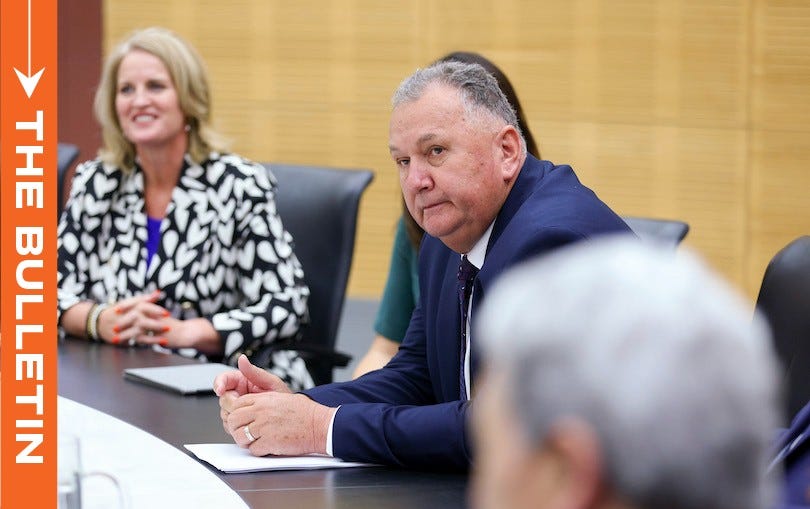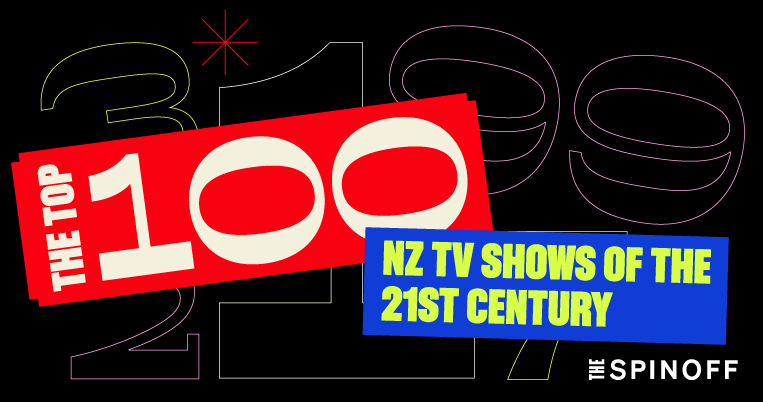Shane Jones, prince of the provinces, looks to the big wide world
The regional development minister is in Singapore as he says 'beggars can’t be choosers' about where we get support for new local projects.
Mōrena, and welcome to The Bulletin for Monday, October 21.
In today’s edition: Opposition parties contacted over Bayly complaint, New Zealand could host the next America’s Cup (but it’s not a priority), and we count down the best local television shows of the 21st century. But first, why the “prince of the provinces” is spending the next few days in Singapore.
Foreign investment in the regions
The regional development minister has headed to Singapore for a week long trip to meet with “potential investors, business leaders and policymakers”. It’s not unexpected for ministers to head overseas to try and lure influential people back into New Zealand, but the timing of the trip is notable given it’s about a week after both the government and Shane Jones’ own party, New Zealand First, doubled down on their plan to try and secure overseas investment in New Zealand.
“I want to hear about the opportunities investors and industry in Singapore are interested in exploring and share more about our work to develop a pipeline of investible infrastructure opportunities,” said Jones in a statement.
Searching for solutions
Jones holds several interconnected titles in the coalition – along with regional development minister, he’s also minister for resources and fisheries. He also wields a significant amount of power as one of the trio of ministers with oversight for the controversial fast-track legislation (though, remember, some of this control has been watered down in the face of opposition).
It’s of no surprise then that in this government and previous administrations, he has pitched himself as the so-called “prince of the provinces”. In a wide-ranging interview before the election with The Spinoff’s Duncan Greive, Jones described his identity as being “rooted in a rural existence and a regional existence”. Speaking to the NBR’s Brent Edwards ahead of his trip abroad (paywalled), Jones explained why he and his party has softened their historic hostility towards foreign investment – and how it will benefit rural New Zealand. “Let’s face it, beggars can’t be choosers,” he said. “We have a huge infrastructure deficit in New Zealand [and] we cannot fund it exclusively from taxpayer revenue.”
Of particular interest to Jones is the need to upscale our energy sector (Jones is also associate energy minister) and he will meet with several groups related to this area while in Singapore. Jones told the NBR he was keen to try and boost our geothermal capability, noting that it was “devilishly hard” to increase solar and wind power, while difficult to develop new sources of hydroelectricity. Jones recently told 1News there was a “tremendous future” for expanding our geothermal energy. "Wouldn't it be great if we were the first nation in the world to draw from a new energy source — supercritical, deep-seated, infinite source of geothermal energy?" he said.
Creating opportunities at home
Back home, Jones remains committed to bolstering the regions and in an interview with the Herald’s Joseph Los’e described the need to govern not “purely for Khandallah or Kohimarama”. In the Ardern government, Jones was charged with doling out cash from the $3bn Provincial Growth Fund, which he said helped to boost economic outcomes. “Take the Te Tai Tokerau irrigation project. For Māori landowners, if you don’t have irrigation or water, the land is just an emotional heirloom,” he said. In the current coalition, Jones has a smaller $1.2bn pool for his rejigged Regional Infrastructure Fund. Applications for funding opened in July, while this year’s budget also confirmed $200m would go towards flood resilience infrastructure. The minister has been on a large regional tour as he works to promote his fund and call for applications. At a forestry summit in Gisborne last week, Jones described himself as a pro-growth and pro-industry politician.
National previously criticised Jones for effectively overseeing a “slush fund”, though infrastructure minister Chris Bishop said things are different this time around as the new fund would be “ministered well and diligently", reported RNZ. In a report for his Politik website (paywalled), Richard Harman explained that the new fund focused on “investments rather than grants” and was primarily a “capital fund that provides funding through a mix of loan and equity investments”. Jones, speaking at a forum in Northland on the outskirts of Ngawha Prison, described his main “mission” as regional development minister was to “ensure that infrastructure, jobs, but most importantly investment, can proceed with a minimum amount of fuss so that we create opportunities where such facilities [prisons] over time don’t have such a high level of occupancy”.
‘A new lease of life’
Jones hasn’t gone about promoting the regions without attracting a fair amount of attention. As resources minister, Jones has unabashedly backed the reversal of the oil and gas exploration ban he previously endorsed while in government with Labour. "This is a multi-decade set of changes, but it's better that we get ahead of the curve,” Jones said in 2018 when the ban was announced. He’s been leading the charge to reignite the mining sector, relishing the chance to speak to packed town halls, often while loudly retaliating against the protesters outside. As a minister with oversight for fast-track, he found himself in hot water over an undeclared meeting with a mining boss. In other words, Jone has been busy – both to the delight of his supporters and the fury of his detractors.
On the latest episode of The Spinoff’s politics podcast Gone by Lunchtime, co-host Ben Thomas described Jones as a “surprise” high performer in the current government. “Jones has never been known for his work rate,” said Thomas. “You generally don't associate Shane Jones with sort of… really getting through the papers and the work, but he's really had a new lease of life in this government.”
Join our community of supporters
"I like that it feels like chipping in for a good cause, rather than paying for a subscription." – Kimberley, Spinoff member.
Whether you read, listen to or watch our mahi, you can support us to do more by donating today or signing up to become a member. Already a member? Ka nui te mihi, your support means the world to us.
Opposition parties contacted over Bayly complaint
Late on Friday afternoon, small business minister Andrew Bayly issued a public apology for purportedly labelling swearing at a worker during a business visit and calling him a loser. As the Herald reported, Bayly “unreservedly apologised” to the person and the prime minister. Christopher Luxon accepted the apology but said “these actions fell well short of my expectations”. Bayly, in an interview with RNZ’s Lisa Owen, expressed some doubt the events occurred exactly as described in the complaint but wouldn’t get into the precise details. Bayly maintained he had believed the encounter was a “lighthearted exchange” and did not realise he had offended the worker.
As for why the news of the complaint dropped in the unfriendly news slot of late Friday afternoon (when unwanted news stories tend to make their way into the public domain), The Post’s Thomas Manch has revealed that opposition parties were contacted by the complainant on Thursday. We can expect to hear more on this issue today as the PM fronts for his weekly post-cabinet press conference. Writing for The Post over the weekend, Andrea Vance questioned whether the “Wine Mocks affair” was an example of banter, or something worse. “There’s nothing funny about humiliating someone in their workplace. If it was a joke, it was a cruel and obnoxious one,” wrote Vance.
Introducing… The top 100 NZ TV shows of the 21st century
Every day this week, The Spinoff will be counting down as we determine once and for all the greatest local television show of the past quarter century. In an introduction this morning, Alex Casey explains why now is the time to launch this epic editorial project.
This project has been germinating since late last year, while we were all in the white knuckle grip of After the Party (hmm, wonder if that will make the list?). Our editor Madeleine Chapman mused that it was the best drama we’ve ever made, and turned to the internet to fact check herself. While NZ On Screen is a treasure trove and there’s plenty of end-of-year lists, there was nothing that gave a wider overview of New Zealand television, no list to compare shows and fill in any knowledge gaps.
Join us on The Spinoff every day at 9am to discover the latest ranking (today will see the 100-80 spots released, and so on) and see where your favourite lands. Not every show could make the list and the criteria to qualify was very specific (shows not made in New Zealand, like Flight of the Conchords, don’t count and neither do international formats like The Traitors).
And if you haven’t already, subscribe to Rec Room now to get the rankings delivered directly to you as soon as they're live each day.
Listen: A brand new episode of Behind the Story
Senior writer Anna Rawhiti-Connell steps into the hosting chair to talk to editor Madeleine Chapman about her exclusive reporting on the hiring process for three human rights commissioner roles.
Click and Collect
Up to $333-a-month water bill coming down the Wellington pipeline.
RNZ’s Farah Hancock looks at the challenge to upgrade the Resource Management Act.
Is the CCP suppressing protest in New Zealand? Stuff’s Paula Penfold investigates.
The government is open to discussions around the next America's Cup being hosted in New Zealand, but is warning economic times are tight.
Also in sport: Auckland FC debut was a game changer for the city, writes Scotty Stevenson.
The government is working to change the Public Works Act to more efficiently acquire private land for large-scale public projects, such as new highways.
David Seymour’s Ministry for Regulation has the third highest average salary in the public service. (NZ Herald Premium, paywalled)
For The Detail podcast: Is the government’s new directive that public services should be prioritised on the basis of need, not race, a championing of equity – or has it just removed a vital tool from decision-makers?
Liam Rātana rides shotgun with Auckland’s newest dog patrol. For The Spinoff Essay, Kristin Kelly reflects on the true value of a home. Lyric Waiwiri-Smith reflects on the passing of One Direction’s Liam Payne and the power of fandom. In the latest My Life in TV, Rocky Horror’s Richard O’Brien shares his love of YouTube. Claire Mabey puts some of her burning questions to Maurice Gee, one of the country’s greatest writers. Ōtautahi singer-songwriter Mousey shares her perfect weekend playlist. How does The Office Australia stack up against its iconic predecessors? We tune into the first few episodes.
That’s it for today, thanks for reading. See you back here tomorrow morning.
Want to get in touch? Join the conversation in the Substack comments section below or via email at thebulletin@thespinoff.co.nz if you have any feedback on today’s top stories (or anything else in the news).
If you liked what you read today, share The Bulletin with friends, family and colleagues.















《“devilishly hard” to increase solar and wind power,》
Uncle Shane, you could go to China and make a deal for solar panels and batteries for a couple of million households or businesses, and distribute them at cost + 5%, (perhaps even underwriting loans to enable low income households to participate, but only if it doesn't stick in your craw to help bottom feeders).
The hydro system then becomes like a battery, held in reserve for peak periods.
The governments cost of borrowing money is less than the returns investors will expect. This is economic idiocy.